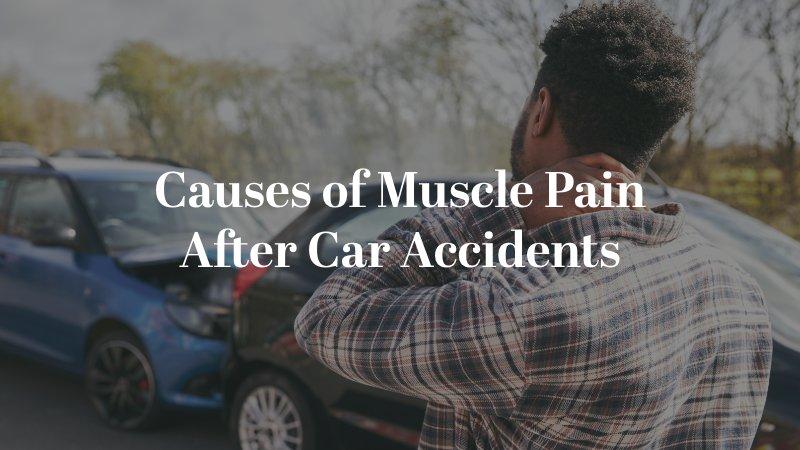Car accidents often cause muscle pain. While muscle pain is a fairly common car accident injury, it may indicate deeper more serious injuries if the pain persists. If you’re suffering from muscle pain after a car accident, it is important to determine whether you are experiencing muscle soreness or a muscle injury. Leaving a muscle injury untreated can lead to extreme pain and weakness and may become chronic.
If you’ve recently been in a car accident and are experiencing muscle soreness, it is a good idea to schedule an appointment with your doctor so that they may help you determine the full extent of your injuries.

How Long Should Soreness Last After An Accident?
Typically, soreness will last for six weeks following a car accident, however, it may last shorter or longer depending on the severity of the underlying injury. For example, soreness from a minor strain may last only three weeks, whereas severe whiplash can last for up to two or three months. It is important to see a doctor as soon as possible after an accident so that you can track your injuries.
If you are experiencing soreness or pain for longer than expected, consider scheduling a follow-up appointment with your doctor to ensure your injuries have been properly identified. If your injuries become long-term and require rehabilitation, our attorneys can help you file a claim for compensation.
Common Injuries Sustained in Car Accidents That May Cause Muscle Pain
Muscle pain you experience following an accident can be attributed to various injuries, some of which may not be apparent right away. Understanding these common injuries can help you better assess your condition and seek appropriate medical attention. Some of the most frequent injuries that cause muscle pain include the following.
Whiplash
Whiplash occurs when the head is suddenly jerked backward and then forward, causing strain to the neck muscles and ligaments. This rapid movement can cause significant muscle pain and stiffness in the neck, shoulders, and upper back.
Airbag Injuries
While airbags are critical for saving lives during a crash, they can also inflict injuries. The force of the airbag deploying can cause bruises, abrasions, and muscle strains in the chest, face, and upper body. The impact can also cause muscle pain due to the sudden and forceful movement.
Seat Belt Injuries
Although they are essential for safety, seatbelts can cause injuries during a collision. The force of a sudden stop can cause the seatbelt to strain the muscles of the chest, abdomen, and shoulder. This can cause bruising, muscle pain, and even more severe injuries if the impact is strong enough.
Fractured Vertebrae
A severe car accident can result in fractures to the vertebrae in your spine. This type of injury is extremely serious and can cause intense muscle pain and spasms in the back and neck. Immediate medical attention is necessary to assess and treat vertebral fractures.
Spinal Disc Injuries
Spinal disc injuries, such as herniated or slipped discs, can occur during a car accident. These injuries can put pressure on the nerves in the spine, leading to muscle pain, weakness, and numbness. The pain from a spinal disc injury can radiate to other parts of the body, exacerbating discomfort.
Contusions and Lacerations
Contusions (bruises) and lacerations (cuts) are quite common in car accidents due to impact on parts of the vehicle or debris. Bruises can cause significant muscle pain and tenderness in the affected area, while deep cuts may damage underlying muscle tissue, leading to pain and potential complications if not properly treated.
Sprains & Strains
Springs are ligament injuries and strains are injuries to muscles or tendons, and both are frequent outcomes of car accidents. These injuries result from the sudden and forceful movement experienced during a crash. Sprains and strains can cause prolonged muscle pain swelling, and reduced mobility, making daily activities challenging.
If you are experiencing injuries after a car accident in Denver, contact our firm today for a free legal consultation.